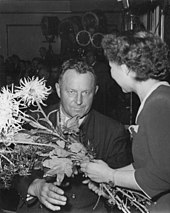Josef Little
Josef (Sepp) Wenig (* July 17, 1896 in Leiter ; † April 16, 1981 in Karl-Marx-Stadt ) was one of the first initiators of the innovator and activist movement in mining in the GDR. Not least because of this work, he became a member of the federal executive committee of the FDGB and later a member of the central committee of the SED . From 1950, Wenig represented the FDGB as a member of the People's Chamber . Josef Wenig was honored with the highest awards in the GDR.
Life
Little was born in 1896 in the West Bohemian town of Leiter (now Řebří) , which then belonged to Austria-Hungary , as the son of brickworkers. However, he spent his childhood and youth in Zeulenroda , Thuringia , where he attended elementary and community school from 1903 to 1911. After that he hired himself in various activities without training until 1914. In 1914, Wenig was drafted into the German Army , in which he remained until 1918. After the war he worked as a transport worker in Zeulenroda and Kahla until 1929 . In March 1920, Wenig took an active part in the fight against the Kapp Putsch . In 1924 he became a member of the KPD , later also of the RFB . He was also involved in the transport workers' association. Probably in the course of the global economic crisis , Wenig left his home in 1929 and went to sea. At the age of 40, he completed training as a ship mechanic from 1936. After this training, from 1939 until the end of the war, Wenig went to sea as a stoker and machinist on merchant ships.
politics
After the war, Josef returned to Zeulenroda in the summer of 1945 and worked there as a transport worker in the local wholesaler until 1947. He had his KPD membership reactivated and in 1946 he automatically became a member of the SED. In 1948, Wenig followed the advertising of the then SAG Wismut and began to work in uranium mining as a conveyor man . He quickly worked his way up, became a tusker, brigadier and finally a top climber. From 1949, Wenig also belonged to the SED area leadership in Wismut. At the same time, the more than fifty-year-old little in 1949 became a labor inspector at SAG Wismut in Schneeberg and Auerbach. In 1950 he was one of the first activists to be honored with the title " Hero of Labor " for his achievements and his commitment within just over two years . From 1950 he represented the FDGB as a member of the People's Chamber , in which he sat until his death in 1981. From 1952 to 1958, Wenig was a member of the FDGB's federal executive committee. In 1954 he became a member of the Central Committee of the SED, which he remained until his death. In 1955, little was appointed labor director at the general management of SDAG Wismut in Karl-Marx-Stadt. Proof of his trust in him can also be seen in the fact that he did not give up this post until 1966, when he was already seventy years old. Even after that, he did not retire, but worked until 1968 as a representative for innovation at SDAG Wismut. Josef Wenig only retired in July 1968 at the age of 72. In the following years, however, he continued to sit as a member of the People's Chamber and was honored with high state awards. At the age of 85, he died in Karl-Marx-Stadt in 1981.
Others
In the multi-part television film Columbus 64 by Ulrich Thein from 1966, Wenig played himself.
Works
- Josef Wenig: My work experience. Berlin 1951.
Honors
- 1950 "hero of work"
- 1951 National Prize of the GDR
- 1954 and 1961 - Patriotic Order of Merit of the GDR in different levels
- 1955 Fritz Heckert Medal
- 1955 Honored Miner
- 1966 Order of Lenin
- 1970 Bar of Honor for the Patriotic Order of Merit
- 1971 Karl Marx Order
- 1976 Star of Friendship between Nations
In Zeulenroda and in Johanngeorgenstadt were Polytechnic Secondary School named after him. The designations were reversed immediately after 1990.
literature
- Bernd-Rainer Barth : Little, Josef (Sepp) . In: Who was who in the GDR? 5th edition. Volume 2. Ch. Links, Berlin 2010, ISBN 978-3-86153-561-4 .
Individual evidence
- ↑ Hans Joachim Wiesner: Award list for the honorary title "Honored Miner of the GDR" from 1951 to 1989 . November 2013, p. 4 ( deutsche-gesellschaft-fuer-ordenskunde.de [PDF; 894 kB ; accessed on April 21, 2020]).
Web links
| personal data | |
|---|---|
| SURNAME | Little, Josef |
| ALTERNATIVE NAMES | Little, Sepp |
| BRIEF DESCRIPTION | German politician (SED), MdV, member of the Central Committee of the SED |
| DATE OF BIRTH | July 17, 1896 |
| PLACE OF BIRTH | ladder |
| DATE OF DEATH | April 16, 1981 |
| Place of death | Karl Marx City |
